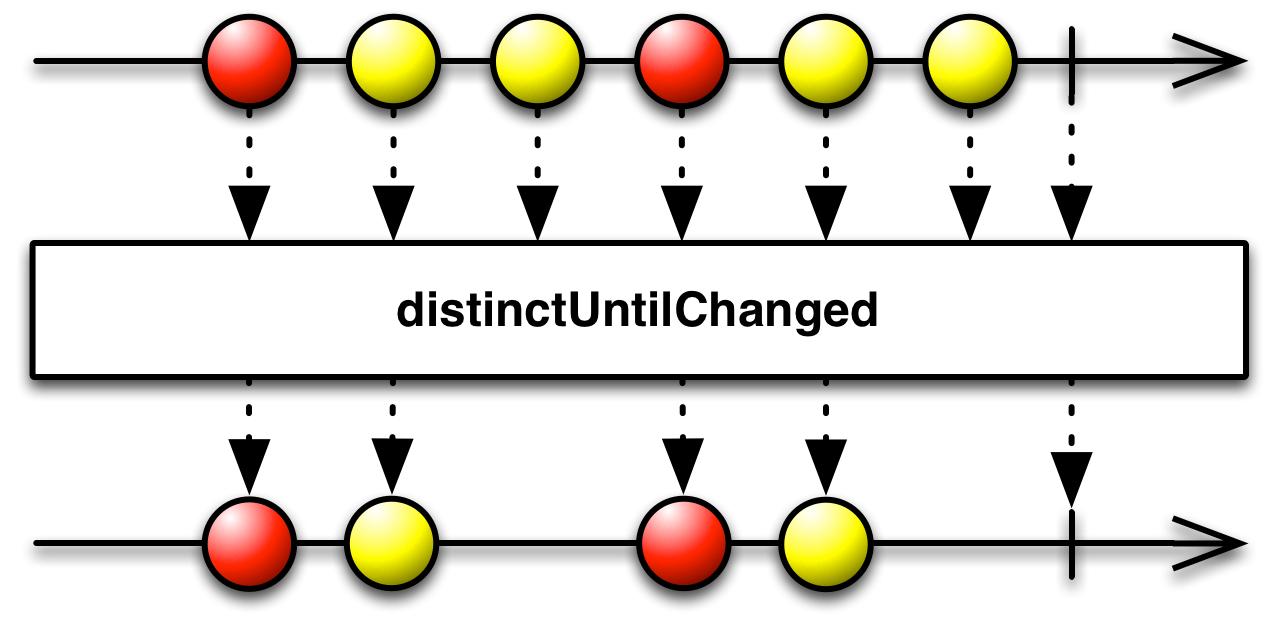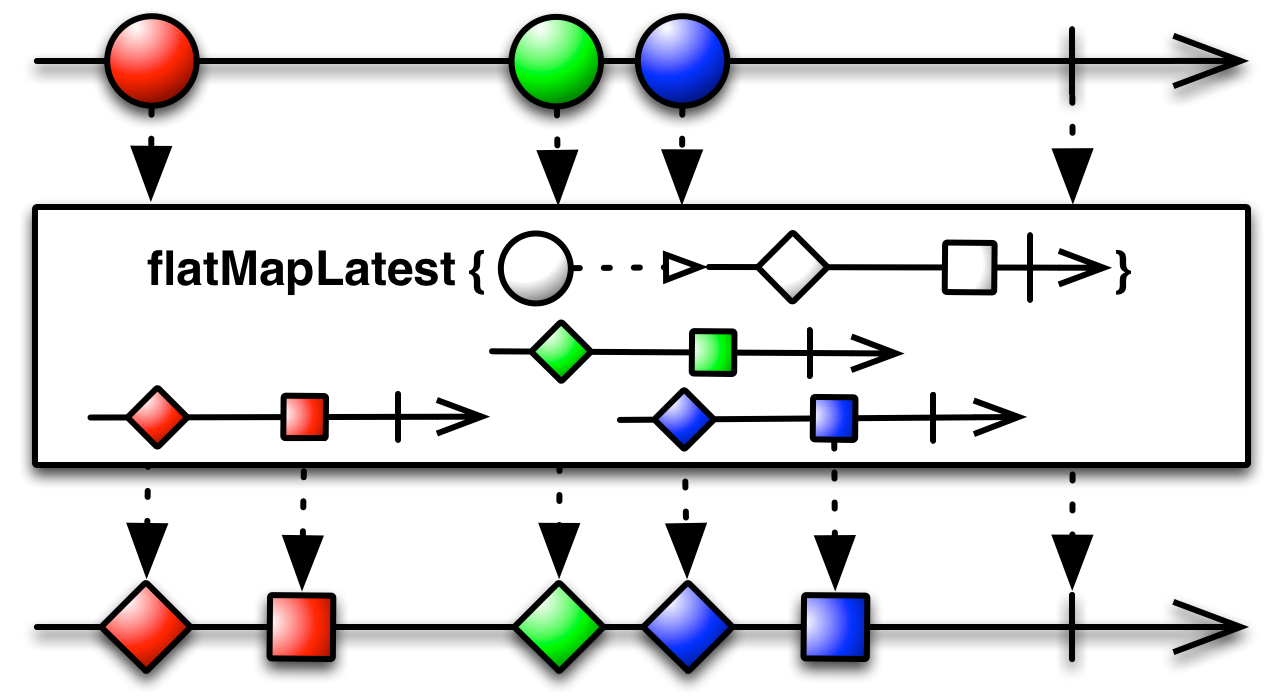abstract class StreamT[M[_], A] extends AnyRef
- Alphabetic
- By Inheritance
- StreamT
- AnyRef
- Any
- Hide All
- Show All
- Public
- Protected
Instance Constructors
- new StreamT()
Concrete Value Members
- final def !=(arg0: Any): Boolean
- Definition Classes
- AnyRef → Any
- final def ##: Int
- Definition Classes
- AnyRef → Any
- def ++(bs: => StreamT[M, A])(implicit m: Functor[M]): StreamT[M, A]
- def ::(a: A)(implicit M: Applicative[M]): StreamT[M, A]
- final def ==(arg0: Any): Boolean
- Definition Classes
- AnyRef → Any
- final def asInstanceOf[T0]: T0
- Definition Classes
- Any
- def asLazyList(implicit ev: ===[M[Step[M, A]], Id.Id[Step[Id.Id, A]]]): LazyList[A]
Converts this
StreamTto a lazyLazyList, i.e.Converts this
StreamTto a lazyLazyList, i.e. without forcing evaluation of all elements. Note, however, that at least one element of this stream will be evaluated, and depending on the structure of this stream, up to two elements might be evaluated. - def clone(): AnyRef
- Attributes
- protected[lang]
- Definition Classes
- AnyRef
- Annotations
- @throws(classOf[java.lang.CloneNotSupportedException]) @native()
- def collect[B](pf: PartialFunction[A, B])(implicit M: Functor[M]): StreamT[M, B]
- def distinctUntilChanged(implicit M: Functor[M], A: Equal[A]): StreamT[M, A]
Returns a new StreamT only containing items that are different from their previous items.
Returns a new StreamT only containing items that are different from their previous items.

- def distinctUntilChanged(latest: A)(implicit M: Functor[M], A: Equal[A]): StreamT[M, A]
Returns a new StreamT only containing items that are different from their previous items.
- def drop(n: Int)(implicit M: Functor[M]): StreamT[M, A]
- def dropWhile(p: (A) => Boolean)(implicit m: Functor[M]): StreamT[M, A]
- final def eq(arg0: AnyRef): Boolean
- Definition Classes
- AnyRef
- def equals(arg0: AnyRef): Boolean
- Definition Classes
- AnyRef → Any
- def filter(p: (A) => Boolean)(implicit m: Functor[M]): StreamT[M, A]
- def finalize(): Unit
- Attributes
- protected[lang]
- Definition Classes
- AnyRef
- Annotations
- @throws(classOf[java.lang.Throwable])
- def flatMap[B](f: (A) => StreamT[M, B])(implicit m: Functor[M]): StreamT[M, B]
- def flatMapLatest[B](f: (A) => StreamT[M, B])(implicit M: Nondeterminism[M]): StreamT[M, B]
The flatMapLatest operator behaves much like the mergeMap except that whenever a new item is emitted by the source StreamT, it will not subscribe to and stop mirroring the StreamT that was generated from the previously-emitted item, and begin only mirroring the current one.
The flatMapLatest operator behaves much like the mergeMap except that whenever a new item is emitted by the source StreamT, it will not subscribe to and stop mirroring the StreamT that was generated from the previously-emitted item, and begin only mirroring the current one.

- def foldLeft[B](z: B)(f: (B, A) => B)(implicit M: Monad[M]): M[B]
- def foldLeftRec[B](z: B)(f: (B, A) => B)(implicit M: BindRec[M]): M[B]
- def foldMap[B](f: (A) => B)(implicit M: Foldable[M], B: Monoid[B]): B
- def foldRight[B](z: => B)(f: (=> A, => B) => B)(implicit M: Monad[M]): M[B]
- def foldRightM[B](z: => M[B])(f: (=> A, => M[B]) => M[B])(implicit M: Monad[M]): M[B]
foldRightwith potential to terminate early, e.g.foldRightwith potential to terminate early, e.g. on an infinite stream. - def foldRightRec[B](z: => B)(f: (=> A, => B) => B)(implicit M: BindRec[M]): M[B]
- def foreach(f: (A) => M[Unit])(implicit M: Monad[M]): M[Unit]
- def foreachRec(f: (A) => M[Unit])(implicit M: Monad[M], B: BindRec[M]): M[Unit]
- final def getClass(): Class[_ <: AnyRef]
- Definition Classes
- AnyRef → Any
- Annotations
- @native()
- def hashCode(): Int
- Definition Classes
- AnyRef → Any
- Annotations
- @native()
- def head(implicit M: Monad[M]): M[A]
- def headOption(implicit M: Monad[M]): M[Option[A]]
- def headOptionRec(implicit M: BindRec[M]): M[Option[A]]
- def headRec(implicit M: BindRec[M]): M[A]
- def isEmpty(implicit M: Monad[M]): M[Boolean]
- def isEmptyRec(implicit M: BindRec[M]): M[Boolean]
- final def isInstanceOf[T0]: Boolean
- Definition Classes
- Any
- def length(implicit m: Monad[M]): M[Int]
- def lengthRec(implicit M: BindRec[M]): M[Int]
- def map[B](f: (A) => B)(implicit m: Functor[M]): StreamT[M, B]
- def mapM[B](f: (A) => M[B])(implicit M: Monad[M]): StreamT[M, B]
- Since
7.0.1
- def memoize(implicit m: Functor[M]): StreamT[M, A]
- def mergeMap[B](f: (A) => StreamT[M, B])(implicit M: Nondeterminism[M]): StreamT[M, B]
- def mergeWith(f2: => StreamT[M, A])(implicit M: Nondeterminism[M]): StreamT[M, A]
- final def ne(arg0: AnyRef): Boolean
- Definition Classes
- AnyRef
- def noSkip(implicit M: Monad[M]): StreamT[M, A]
Returns a new StreamT that does not contain StreamT.Skip steps, while yields the same elements as
this. - def noSkipRec(implicit M: BindRec[M]): StreamT[M, A]
Returns a new StreamT that does not contain StreamT.Skip steps, while yields the same elements as
this.Returns a new StreamT that does not contain StreamT.Skip steps, while yields the same elements as
this. - final def notify(): Unit
- Definition Classes
- AnyRef
- Annotations
- @native()
- final def notifyAll(): Unit
- Definition Classes
- AnyRef
- Annotations
- @native()
- def postScanLeft[B](head: B)(op: (B, A) => B)(implicit M: Functor[M]): StreamT[M, B]
- def scan[B >: A](op: (B, B) => B)(implicit M: Functor[M]): StreamT[M, B]
Computes a prefix scan of the elements of the collection.
Computes a prefix scan of the elements of the collection.
Note: The neutral element
Bmay be applied more than once.- B
element type of the resulting collection
- op
the associative operator for the scan
- returns
a new StreamT containing the prefix scan of the elements in this $coll
- def scanLeft[B](head: B)(op: (B, A) => B)(implicit M: Applicative[M]): StreamT[M, B]
Produces a StreamT containing cumulative results of applying the operator going left to right, including the initial value.
Produces a StreamT containing cumulative results of applying the operator going left to right, including the initial value.
- B
the type of the elements in the resulting collection
- head
the initial value
- op
the binary operator applied to the intermediate result and the element
- returns
collection with intermediate results
- final def synchronized[T0](arg0: => T0): T0
- Definition Classes
- AnyRef
- def tailM(implicit M: Monad[M]): M[StreamT[M, A]]
- def tailMRec(implicit M: BindRec[M]): M[StreamT[M, A]]
- def tailOption(implicit M: Monad[M]): M[Option[StreamT[M, A]]]
- def tailOptionRec(implicit M: BindRec[M]): M[Option[StreamT[M, A]]]
- def take(n: Int)(implicit M: Functor[M]): StreamT[M, A]
- def takeWhile(p: (A) => Boolean)(implicit m: Functor[M]): StreamT[M, A]
- def toLazyList(implicit M: Monad[M]): M[LazyList[A]]
**Warning:** Requires evaluation of the whole stream.
**Warning:** Requires evaluation of the whole stream. Depending on the monad
M, the evaluation will happen either immediately, or will be deferred until the resultingLazyListis extracted from the returnedM. - def toLazyListRec(implicit M: BindRec[M]): M[LazyList[A]]
**Warning:** Requires evaluation of the whole stream.
**Warning:** Requires evaluation of the whole stream. Depending on the monad
M, the evaluation will happen either immediately, or will be deferred until the resultingLazyListis extracted from the returnedM. - def toString(): String
- Definition Classes
- AnyRef → Any
- def trans[N[_]](t: ~>[M, N])(implicit M: Functor[M]): StreamT[N, A]
- def uncons(implicit M: Monad[M]): M[Option[(A, StreamT[M, A])]]
- def unconsRec(implicit M: BindRec[M]): M[Option[(A, StreamT[M, A])]]
- final def wait(): Unit
- Definition Classes
- AnyRef
- Annotations
- @throws(classOf[java.lang.InterruptedException])
- final def wait(arg0: Long, arg1: Int): Unit
- Definition Classes
- AnyRef
- Annotations
- @throws(classOf[java.lang.InterruptedException])
- final def wait(arg0: Long): Unit
- Definition Classes
- AnyRef
- Annotations
- @throws(classOf[java.lang.InterruptedException]) @native()
- def weakMemoize(implicit m: Functor[M]): StreamT[M, A]